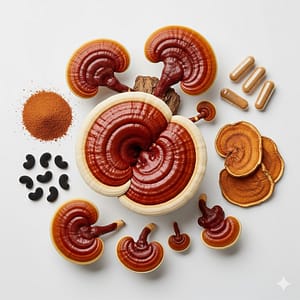- Home
- Reishi Mushroom

I. General Information
A. Scientific Name:
Ganoderma lucidum
B. Alternative Names:
Lingzhi (Chinese), Mannentake (Japanese), Mushroom of Immortality
C. Pronunciation:
/ˈreɪʃi/
II. Sourcing and Origin
A. Source:
A species of shelf fungus that grows on decaying hardwood trees
B. Geographic Origin:
Native to various parts of Asia, particularly China, Japan, and Korea.
C. Method of Processing:
Due to its rarity in the wild, Reishi is cultivated commercially on logs or sawdust. It is typically harvested, dried, and ground into a powder or used to create extracts and tinctures.
III. Properties and Uses
A. Physical Properties:
A woody, bracket-shaped mushroom with a reddish-brown, glossy cap. It is very bitter and has a hard, cork-like texture.
B. Chemical Composition:
Rich in triterpenes (ganoderic acids) with antioxidant and anti-inflammatory properties.
Contains β-glucans (immune-modulating polysaccharides).
Sterols, peptides, and phenolic compounds.
Small amounts of protein, fiber, and trace minerals.
C. Primary Uses:
Skincare: Antioxidant and anti-aging, reduces inflammation, supports skin healing.
Haircare: Strengthens hair follicles and promotes scalp health through improved circulation.
Wellness: Known as an adaptogen; supports immune system, reduces stress, enhances sleep quality, improves liver health, and may support cardiovascular health.
Culinary: Rarely consumed as food due to bitter taste and woody texture.
Household/Industry: Commonly formulated into teas, herbal blends, tinctures, and functional supplements.
D. Key Benefits:
Promotes relaxation, supports sleep, boosts immune function, and has anti-inflammatory properties.
IV. Safety and Considerations
A. Potential Allergies:
Rare, but some people may experience digestive upset or dizziness.
B. Best Practices for Use:
Best consumed as a powder or extract.
C. Special Precautions:
Generally safe in moderate amounts.
Possible side effects: dizziness, dry mouth, digestive upset.
May increase risk of bleeding, caution for individuals on anticoagulants.
Not recommended for people with low blood pressure, bleeding disorders, or prior to surgery.
V. Fun & Educational Facts
A. Historical Context:
Reishi has been used for over 2,000 years in traditional Chinese medicine and is highly revered as a symbol of health, longevity, and spiritual power.
B. Did You Know?
Its ancient nickname, "Mushroom of Immortality," reflects the high regard it was held in by ancient emperors and sages.
C. DIY Recipe Idea:
Reishi "Calm" Tea: Add 1/2 teaspoon of Reishi mushroom powder to hot water with honey and a slice of lemon.
